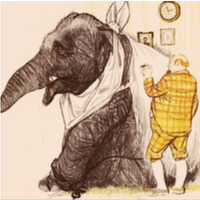VI
VI
VI
VI
VI
Ночью слона ведут в гости к больной девочке.
||||||malade|
at night|elephant|lead||||sick|
At night, an elephant is taken to visit a sick girl.
La nuit, ils mènent l'éléphant en visite chez une jeune fille malade.
Он шагает по самой середине улицы и качает головой.
|marche||la|milieu||||
|walks||in the very (emphasizing 'середине')|in the middle||||
He paces the very middle of the street and shakes his head.
Il marche au milieu de la rue et secoue la tête.
Вокруг него, несмотря на поздний час, большая толпа.
autour||malgré||tardive||grande|la foule
||||late|||a crowd
There is a large crowd around him, despite the late hour.
Autour de lui, malgré l'heure tardive, il y a une grande foule.
Но слон не обращает внимания на людей.
||||attention||
|||pays|||
But the elephant pays no attention to humans.
Подходят к дому.
s'approchent||
Approaching the house.
Перед лестницей слон останавливается и упрямится.
|la marche||s'arrête||fait de la résistance
|||stops||refuses to move
In front of the stairs, the elephant stops and is stubborn.
— Надо дать ему что-то вкусное…— говорит немец.
- We should give him something tasty..." says the German.
— Il faut lui donner quelque chose de délicieux...— dit l'Allemand.
Надин отец бежит в соседнюю булочную и покупает большой круглый фисташковый торт.
||||voisine|la boulangerie|||||à la pistache|
||||to the neighboring|bakery||||round|pistachio|
Nadine's father runs to the neighborhood bakery and buys a big round pistachio cake.
Le père de Nadine court à la boulangerie voisine et achète un grand gâteau rond à la pistache.
Хозяин даёт слону один кусок.
Le maître||||
|gives|||piece
The master gives the elephant one piece.
Le propriétaire donne un morceau à l'éléphant.
Торт приходится по вкусу Томми, и он протягивает хобот за вторым куском.
|||au goût||||tend son nez||||
|is to (with 'торт')|||to Tommy|||reaches|trunk|||
The cake is to Tommy's liking, and he reaches into his trunk for a second piece.
Хозяин поднимается вверх по ступенькам.
|monte|vers le haut||les marches
owner||||the steps
The host walks up the stairs.
Слон идёт за ним и получает другой кусок.
The elephant goes after him and gets another piece.
L'éléphant le suit et obtient un autre morceau.
Таким образом его приводят в столовую.
|in this way||take (to the dining hall)||to the dining hall
Thus he is brought to the dining room.
Ainsi, il est amené à la salle à manger.
Из столовой вынесли всю мебель, на полу лежит солома и еда для слона — морковь и капуста.
||carried out||furniture||||straw|||||carrot||cabbage
All the furniture has been taken out of the dining room, there is straw on the floor and food for the elephant - carrots and cabbage.
Tous les meubles ont été enlevés de la salle à manger, il y a de la paille et de la nourriture pour l'éléphant - des carottes et du chou sur le sol.
Хозяин располагается рядом, на диване.
|is situated|||
The host settles down next to me, on the couch.
Тушат свет, и все ложатся спать.
turn off|||||
The lights go out and everyone goes to bed.

